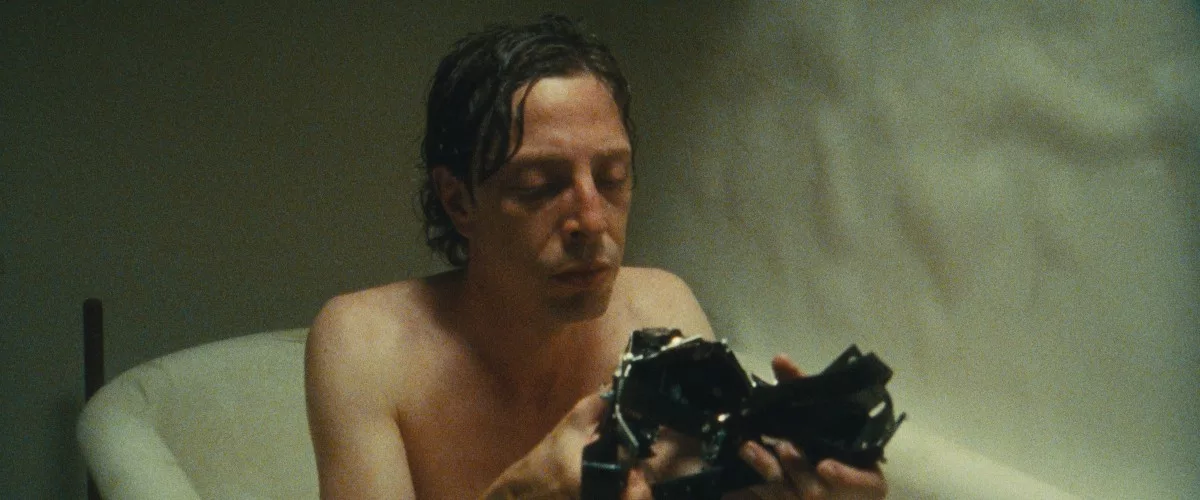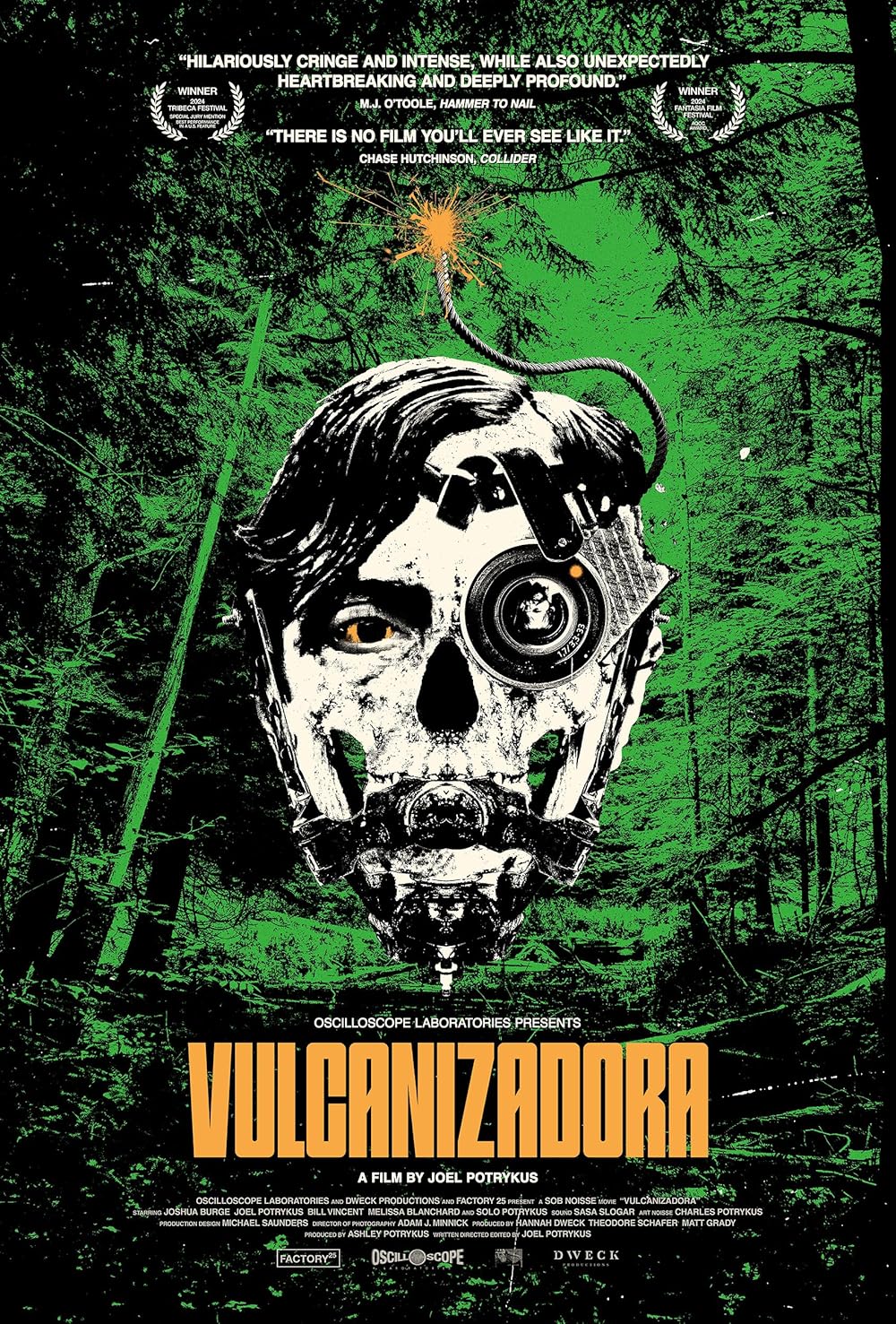It’s tricky to write about writer-director-actor Joel Potrykus’ “Vulcanizadora,” because most of its impact comes from going into the movie without any preparation and feeling as if you’re watching a blank tabletop being filled in with puzzle pieces until a full picture emerges. Complicating things further, it’s a quasi-sequel to an earlier movie, 2015’s “Buzzard,” built around the same two main characters. While you don’t have to watch the former to get anything out of the latter, it helps make the second movie feel more like a complete statement about a long, strange friendship and less like an exercise in audience manipulation and aesthetic daring (lots of long, unbroken takes, either done from very far away or uncomfortably close to faces or significant objects).
The darker half of the duo is Marty. He’s played by Joshua Burge, who has the face of Buster Keaton and the demeanor of a sad French poet from the ‘20s but sounds like a character out of a film by Jared Hess (“Napoleon Dynamite,” “Gentlemen Broncos”). In the first movie, Marty is a petty criminal who embarks on a series of low-rent criminal schemes—including check forging at the bank where he works—then goes on the run after realizing he’d executed his plans with so little foresight he’s sure to be caught. The main stop on his fugitive odyssey is the basement of his coworker at the bank, Derek (Potrykus), who gradually becomes his best friend, if only by default. During “Buzzard,” Marty builds a homemade version of Freddy Krueger’s knife-fingered glove, which seems the height of pop culture-addled triviality but actually helps get him out of a jam later in the story.
It’s the kind of work that could be described as, variously, a “hangout film,” or “minimalist,” or “art-house black comedy,” and would satisfy any of the descriptions without necessarily being lighthearted holiday viewing. It begins with a blast of metal music as Marty and Derek, now ten years older, walk side by side into a forest. Are they hiking? Camping? Something else? All three, but mostly the third thing. Derek is a babbling imp; Marty barely speaks and has a haunted look most of the time, as if he can’t stop picturing a horrible and inevitable future. He’s right to feel troubled, and we discover the reasons as the story unfolds.
Do you want to know even a little bit about the story, even after all the caveats above? If not, skip the next paragraph.
Marty and Derek are going into the woods because Derek is colossally depressed by his life as a divorced father who messed up his life so badly that he can barely see his son now. He wishes to die. He selected Marty as his personal Kevorkian because he just got out of prison for his crimes in “Buzzard” and is about to go back in for setting fire to a tire shop. He won’t get out for a long, long time. Marty doesn’t get too deep into explaining himself, but it’s clear that he’s here to do his pal a favor and perhaps sees it as an honorable use of the time he has left in the free world.
Abbas Kiarostami made a critically acclaimed film with a similar plot called “Taste of Cherry,” and “Vulcanizadora” is in some ways the millennial slacker doofus version of it, as weird as that might sound to devotees of 1990s Iranian cinema. I wouldn’t put it past Potrykus to have seen Kiarostami’s film and been inspired by it. He has a deep well of film history influences. His 2016 feature, “The Alchemist Cookbook,” was inspired by Henry David Thoreau’s “Walden,” and 2018’s “Relaxer” is a riff on Luis Buñuel’s 1962 class satire “The Exterminating Angel.”
There’s a plot and a plan here, laid out through stages in the men’s journey and through the introduction of various props, including bottled beverages, drugs, fireworks, and a strange, homemade helmet that’s like something out of a dystopian action movie. Potrykus makes us lean in and work to extract both information and secondary meaning. There’s a shot of the two guys walking slowly downhill through woods that goes on for several minutes without a cut, and at no point are either of them larger than a speck. There are two long close-ups of a leaf-covered forest floor where Derek is trying to find something he buried, and a long, unbroken close-up of “black mamba” fireworks (the kind that unfurl black writhing masses of what look like tiny snakes).
Marty’s vision of how to accomplish a sacred act is so nonsensical that it feels as if you’ve entered a dream sequence—the aftermath even more so. But then, the entire movie feels like something out of a dream, probably one that struggles to work through something real that keeps getting hijacked and twisted by the mischievous unconscious.
The soundtrack favors just two kinds of music: death metal and opera. You feel for both men, as pathetic and lost as they are, because their brokenness and desperation bleed through all the knucklehead physical comedy on display. It’s not for everyone. I don’t even know if it was for me, really. Considering how many images and moments are stuck in my mind, maybe it was.
I’ve learned over the years that if I come out of a movie not knowing what to say when somebody asks me if I liked it, that probably means I liked it. It’ll just take a lot more time to arrive at that conclusion than I had to write my review. But that’s not always the case. Sometimes you think a movie is just pretty good, or honorable but not involving, and a few years later, you realize that you were being too nice to it, and you’d rather drink vinegar from the bottle than watch it again. I now try to anticipate the evolutionary journey for the benefit of readers while realizing that you truly don’t know what the future will hold until you’re in it.
But I digress. My initial reaction is that I admired this movie more than I liked it. That’s primarily for its two lead performances, which are daring yet controlled, and its chutzpah in withholding and revealing new shadings in the primary relationship while feeding the viewer fresh bits of information. I liked it more after watching “Buzzard.” The star rating at the top of this review reflects how I felt after watching both movies. Without the previous film, it’s half a star less. This is not to say that either film is something that can be strictly quantified with numbers—no film is, though critics make peace with the exercise because a lot of people love and need ratings—but only that this viewer’s experience of “Vulcanizadora” deepened from having seen the movie that led to it.




















